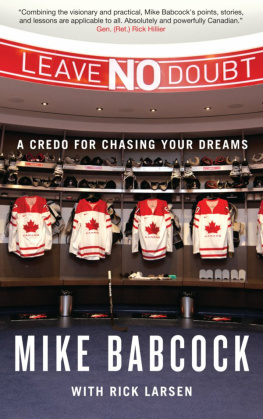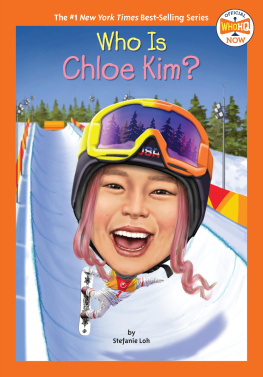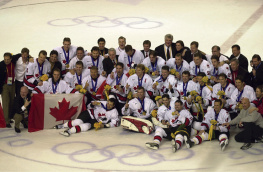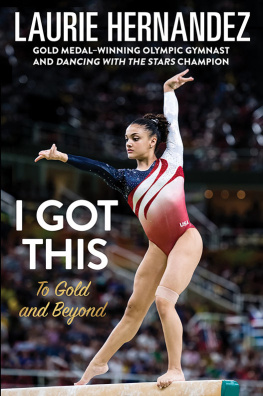Forty years later, its still brought up to me almost daily: An early Friday evening in upstate New York. A team that believed in itself when few others did. A game that will be remembered forever.
I was in my fourth year at ABC Sports and very happy to have the hockey assignment at the Olympics, calling the games alongside the recently retired Ken Dryden, one of the greatest goalies in NHL history. We were witness to this improbable, maybe even impossible, run by the United States team. They were a collection of mainly college kids, primarily from Minnesota and New England, led by a taskmaster coach, Herb Brooks, who convinced them they could take on the world. And at the center of it all was Team USAs burly captain, a twenty-five-year-old former Boston University star, one Mike Eruzione.
Mike and company had reached the medal round of the tournament at Lake Placid and were now set to face off against Goliaththe Soviet Union, inarguably the best team in the world. Just thirteen days earlier, that Soviet team had pummeled the US team, 103, in an exhibition game at Madison Square Garden.
Astonishingly, the American team had hung right in and were tied 33 with the Soviets with ten minutes left, when in the high slot, thirty feet in front of the netERUZIONE SCORES!!! MIKE ERUZIONE!!! USA 4, SOVIETS 3!!!
The next ten minutes felt like ten hoursthe clock was in quicksand. I simply focused on the mechanics of the telecast, just calling each pass, each save, nothing but rudimentary play-by-play. The crowd was going crazy; our broadcast platform was shaking from the noise. This was when you could feel the sound. Finally, there were twenty seconds left. Then ten, with the crowd counting down in unison. And then with about six seconds left, the puck gets cleared out to center ice, all but sealing the win.
Im like almost everyone in America at this point. Can you believe this?!
A word pops into my head: miraculous.
A split second later, it gets morphed into a question and answer:
Do you believe in miracles? Yes!!!
Six words that in my heart punctuated the moment.
There was nothing I had prepared, nothing written down. In my mind, the US had no chance to win the gamethe Soviets wound up outshooting them 3916but Herb Brooks, Mike Eruzione, and the rest of team knew otherwise and provided the greatest American sports moment of the twentieth century.
Two days laterand forgotten by manythe Americans still had to beat Finland to clinch the gold medal. And of course they did, which led to the medal ceremony a few hours later, when Captain Eruzione summoned the entire team to join him on the platform in the greatest celebration scene Ive ever witnessed. In a way, that celebration has never stopped.
Mike also came up with my favorite line about the Soviet game. A few years ago, he told me, You know, if I sometimes get a little down, I just pop that tape in. And the best thing about it? Every time I shoot, the puck goes in!
Enjoy Mikes book. Relish the story of everything that happened before, during, and since that puck went in.
I wasnt on the ice when it ended. As the final minute wound down, I was on the bench, standing, not sitting. Who could sit? Mark Pavelich was on my left, Jack OCallahan on my right. They were on their feet, too. The whole team was up, leaning over the boards, shouting, exhorting the six guys on the ice. Herb Brooks, the man who had engineered this absolutely incredible, unimaginable scene, was standing behind me, arms folded, with that same blank expression, even at the moment of the greatest achievement of his life, probably the greatest achievement of any hockey coach, anytime, anywhere, ever.
As the seconds ticked off, all I could think was Get it out. Get it out. Get the puck out. If we could just chip the puck out of our zone, that would be it. The game would be over. Get it out, and not even the greatest hockey team in the world would have enough time to score, to tie the game, before the final horn. Get it out, and weve pulled off the most shocking upset in Olympic history.
To me, and to my nineteen teammates, it was just a game. We didnt see it as a piece of the Cold War, a showdown between the worlds two superpowers, East versus West, communism versus freedom. I understand why people saw it that way and why, even all these years later, millions of people all across the United States remember where they were and who they were with when it happened. But to the twenty of us players, as it was happening, it was one Olympic hockey gameand not even the final one of those in Lake Placid in 1980. It was just a game between two teams. One was made up of amateurs, college players, and a couple teenagers. The other team were professionals, men, veterans. It was a game played in a little village in upstate New York before only about nine thousand people, while the rest of the country sat down for dinner or turned on the evening news or went about their business with no idea, no clue, what was about to happen.
From the bench, I saw the puck skid over the blue line by the far boards. Out. There were still two seconds left on the clock, but nothing was going to hold us back. Pav, OC, and I hopped the boards. Neal, Buzzy, Bah, Janny, Bobby Suter, Wellsy, and the rest did the same. We charged out, running, jumping, galloping across the ice, skipping like kids on Christmas, all headed for Jim Craig, our goaltender. The only person missing was Herb. When the game ended, when the arena erupted, he disappeared.
I hugged one teammate after another. I found one guy, embraced, then turned to look for the next, embraced him, looked for another, and another, and another. At the far end of the ice, in the stands, my mother and father, my cousin, my high school football coach hugged and cried. I glanced up at the scoreboard: 43. It finally hit me: the goal Id scored twenty minutes earlier had been the difference, the winning goal. I hadnt realized that until then. Then another thought took over my mind: all along I had believed. Once we had learned we were going to play them, Id thought it was possible. It was a long shot for sure, but Id thought if we played well, if we did certain things, wed have a chance. Id thought we could win. I had believed from the beginning. I had believed back when I was eighteen, when I had been all set to become a gym teacher. When a chance meeting had changed the course of my life, I had believed I could play big-time college hockey. When it had come to the Olympic tryouts, I hadnt been the fastest skater, I hadnt been the biggest player, and I hadnt been the most talented, but I had believed. I had believed I could play and contribute. Thats just how I was brought up. Thats how it was in my family. You worked. You worked and worked and you waited, and if an opportunity came up, you kept working. And if you believed in yourself and tried as hard as you could, well, at some point something good would happen.
And now something good, something really good and wonderful and incredible and amazing, had happened, and at that moment, thats when I stopped believing. The thought just kept going through my head as I moved from one teammate to the next.
I cant believe it.
I cant believe it.
I cant believe it, I said to myself, over and over.
I cant believe it.
I cant believe we beat the Russians.
It all started on the tennis courts across the street from the high school. The town I grew up in, Winthrop, Massachusetts, didnt have an ice rink when I was a kid. In winter, someone flooded the tennis courts, and before long there was a sheet of ice for kids to skate on. Sometimes Id go to the golf course and find a sand trap where water was frozen and skate by myself on my own personal rink. Other times kids would skate at the swamp next to the golf course and play pond hockey for hours. When you got thirsty, you chipped a hole in the ice with the toe of your skate blade and drank the swamp water. At the time, the only skates we had in my house were my sister Connies white figure skates. They were too big for me, but I laced them up as tight as I could and joined other boys playing hockey. Hockeys a pretty macho sport, so you can imagine what that was like, wearing my sisters white figure skates. It didnt help that the skates had blue pom-poms on the toes, either. When Connie got out of school, shed come to the tennis courts and take her skates back. Id go home with frozen toes. To warm them, my grandmother would turn on the oven and open the door. Id sit on a chair with my feet inside.







